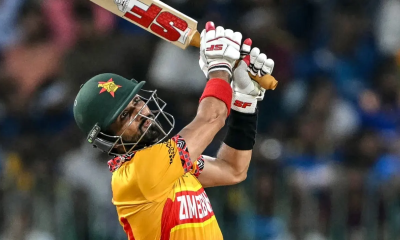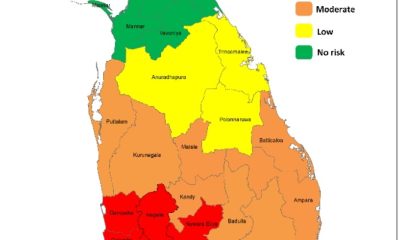Features
Options for Foreign Debt Management in Sri Lanka: Can we escape from IMF/ISB Debt Trap?
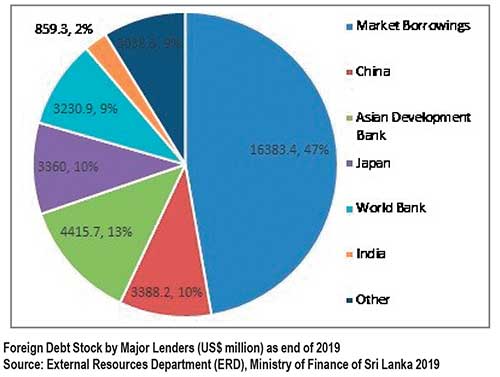
by Luxman Siriwardena,
Managing Director,
Veemansa Innitiative,
Think Tank and Advocacy Group
The setback due to the pandemic has aggravated some of the perennial macro-economic and sectoral problems in Sri Lanka. For example, borrowing and accumulating external debts has been a practice of successive governments since 1978, which was the year of partial liberalization of the economy. During the early periods, when Sri Lanka was considered a low-income country, we were entitled to substantial grant aid as well as concessionary finances.
This relatively low interest facilities and lenient conditionalities provided incentives for the governments to keep borrowing for many development projects, from bi-lateral and multi-lateral lending agencies, irrespective of inflated costs of many of these projects. In most of these cases, financial benefits also have spilled over to Sri Lankan politicians, bureaucrats, and technocrats. Notwithstanding such leakages, these foreign funded projects increased the availability of more sophisticated infrastructure and utilities in sectors such as, electricity, highways, drinking and irrigation water, as well as the Colombo port and airports. In addition, education, agriculture and health were the prime targets of both Sri Lankan policy makers and donors/lenders.
There was a period when Sri Lanka was termed as “a Donor Darling” (see figure).
Sri Lanka became a darling of the Western donors primarily due its subservience to the West under Jayawardena-Premadasa regime). However, since we attained lower-middle income country status, concessionary funding has not been available and therefore, most borrowings have been at commercial or near commercial lending rates. In this context, the country has accumulated over US$ 34.7bn debt1 up to 2019. These borrowings have been for development projects, import of consumption items and direct budgetary support to meet current expenditure, including debt servicing. The current debt situation.
At the moment, one of the most critical challenges for the Rajapaksa administration is managing or preferably reducing Sri Lanka’s debt while meeting the current level of foreign exchange requirements and hopefully implementing necessary development projects.
While the selected development projects are generally presented to the multilateral donors; World Bank and ADB as well as bilateral lending institutions such as JICA, US-AID and similar institutions in China and European countries, seeking loan financing, the rates of lending are equal or closer to the market rates. Since 2007, borrowing through International Sovereign Bonds (ISBs), which became a common practice, has now emerged as the most serious challenge for the current government to ensure sustainability or reduction foreign debt.
The focus of this article is to discuss alternative methods of managing the debt in spite of the COVID-19 pandemic that has pushed almost the entire world (other than China) into a recession.
In this context, conventional economic policy pandits, academics and consultants recommend that the emerging economies such as Sri Lanka should seek the refuge in International Monetary Fund (IMF) Programmes. Based on the IMF guarantees the countries in foreign debt crisis will be eligible for further assistance from other multilateral and bilateral lenders, while qualifying for accessing the International Sovereign Bond Market. According to this prescription, without the support and blessing of the IMF, we have no way of securing sufficient funding for re-payment of maturing debt, balance of payment requirements or development programmes.
Since the election of the new government all our well-known economists, and many so-called experts have been promoting the above policy prescription as Sri Lanka is, according their assessment, at the verge of a default and economic collapse. Most if not, all these pandits were expecting the government will continue to proceed with the borrowing from the international markets subscribing to Samurai or Panda bonds. Surprisingly our conventional economic advisors are increasingly becoming impatient and critical of the Government for not negotiating with the IMF to enter into a programme which will be entitled and receive loan facility and more importantly in turn qualify for raising finance through ISBs. Does this process lead to a reduction of debt or payback of loans? Of course not, nor reduction of debt burden or the severity of the debt problem.
As an IMF programme is likely to impose conditionalities to meet the Fund’s debt sustainability parameters, the readers may perhaps understand that, this approach is not even to reduce the severity of the debt problem but for reducing the burden over the next few years by extending maturities probably through some form of ‘Grace Period’. The bottom line will be that Sri Lanka will continue to have challenging debt dynamics which I would like to call it as ‘IMF/ISB DEBT TRAP’ as long as we fail to achieve substantial increase of exports and FDI. In other words, we will merely be postponing and aggravating the debt problem unless we can accelerate growth by increasing production of tradable goods and services which will earn or save foreign exchange.
Cost of raising funds through International Sovereign Bonds
A sovereign bond is defined as a debt instrument issued by a national government to raise generally foreign currency requirements in case of countries such as Sri Lanka. Sovereign bonds are denominated in foreign currencies such as USD, the Euro, Japanese Yen and Chinese Yuan. The successful issue of ISBs require several steps engaging highly professional individuals and institutions including global banking giants. Under each of these steps many upfront costs are to be incurred by the government. A typical bond issue involves, fees (commissions) and other expenses. Three large components of the fees, according to a World Bank document are for the lead-managers, rating costs and legal expenses. Interestingly those transaction costs are paid at time of issuance (upfront). In spite of the competition among the banks there is little transparency specially with regard to bond issues of countries like Sri Lanka. Another major expense is often for obtaining a rating for each bond which is generally similar to the fee for the lead-managers. There are also expenses for legal counsel, marketing especially road shows, fiscal and paying agents and advisors. Cost will also depend on which markets are targeted for the road shows undertaken in major cities in developed market economies.
Throughout the Sri Lankan history of issuing ISBs people have only learned about the total value of the bond issues and subscribed but not the direct and indirect costs that have been incurred in the process, for example, officials of the Central Bank, Ministry of Finance, etc. will be travelling to several capitals in the world for negotiations, road shows and other associated events etc. incurring scarce foreign exchange of Sri Lanka. Of course it should have provided very tempting incentive for this approach
Some economists who are faithful followers of IMF policy prescriptions prefers to identify the IMF/ISB Debt Trap as the symptom not the cause of the problem. According to them the debt trap was caused by poor fiscal outcomes over many years and IMF/ISB debt was incurred to meet deficit financing.
In this article, the most pertinent and decisive issue to raise is, what should be the alternative policy recommendations of our learned economists. As we all are well aware if Sri Lanka qualifies to receive assistance from the IMF, such funding will be for as balance of payment support subject to certain conditionality which are likely to include; removal or reduction of subsidies, removal of import controls, non-strategic assets privatization, etc. and many such measures of government interventions.
Many, if not all these adjustments will be painful to the ordinary citizens and therefore, make it difficult to sell politically. If Sri Lanka for that matter, any other country in our predicament is not willing to go through an IMF austerity programme with its stringent conditionalities, what options are available for them. Let’s discuss what appears to be the economic management strategy of the current government. With the lockdown of the world economies and disruption of global value-chains, Sri Lankan government was compelled to ‘Close the Economy’ to some degree. Subsequently, the government policy makers seem to be implementing a fairly well-managed import administration scheme and associated measures to ensure enhanced foreign exchange savings. Current import management scheme has selectively targeted non-essential ‘big-ticket’ items.
In order to prevent further deterioration of the debt situation the government seems to be minimizing new borrowings for implementation of numerous development projects with commercial characteristics. Both acceding to IMF austerity programme, as well as, controls imposed by the government will have contractionary impact on the local economy. Of course, second option will reduce the confidence of capital markets, foreign equity investors and even some local enterprises. Generally, IMF programs are sold to a government in-need of balance of payment support on the basis that agreement with the Fund would pave way for the country to achieve a higher sovereign rating and confidence of the investors in ISBs.
Pertinent question here is, as learned economists, professionals and advisors, are they in a position to develop an alternative development strategy for Sri Lanka in order to overcome the current difficulties reducing the severity of the debt burden created primarily through borrowings from ISBs. It appears that the, current administration is developing a strategy that will cause less pain to the people than under an IMF program and have more positive outcomes in terms of output, employment and incomes.
Unfortunately, however, in the past, we have rarely seen Sri Lankan policy makers or even academics develop alternative concepts or strategies instead of repeating what they have learned as classical, neo-classical or Keynesian schools and reinforced by the training programs conducted by multilateral or bilateral lending agencies.
In conclusion, let me quote once again from my recently published article;
“Whatever the reasons are, instead of thinking independently on their own most of our economists parrot their mentors in the west for short-term gains like easy recognition and self-fulfillment PROMOTING THE SAME FORMULA AGRAVATING the vicious circle and perpetuating the misery of our people. Irony is that when a solution is needed the only thing some of our experts are capable of recommending is to seek refuge in borrowing from multilateral or bilateral lending agencies. Most Sri Lankans need to be reminded that, Sri Lanka has already gone under 16-IMF Programs and have reached the current predicament. This reminds us the famous saying attributed to Einstein that “insanity is doing the same thing over and over again and expecting different outcomes’’.
Signs are that the current administration is deviating from the orthodoxy and searching for innovative and pragmatic development path.
(Article is based on a key-note address delivered by the writer at the 08th International Research Conference conducted by the department of Economics and Statistics, University of Peradeniya)
Features
How Black Civil Rights leaders strengthen democracy in the US
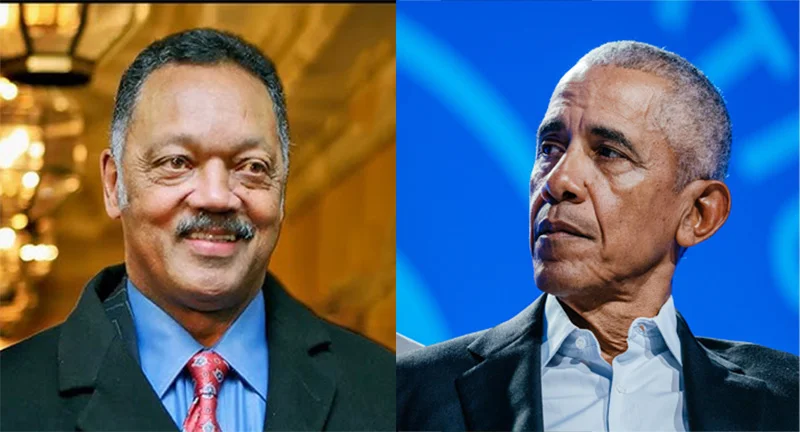
 On being elected US President in 2008, Barack Obama famously stated: ‘Change has come to America’. Considering the questions continuing to grow out of the status of minority rights in particular in the US, this declaration by the former US President could come to be seen as somewhat premature by some. However, there could be no doubt that the election of Barack Obama to the US presidency proved that democracy in the US is to a considerable degree inclusive and accommodating.
On being elected US President in 2008, Barack Obama famously stated: ‘Change has come to America’. Considering the questions continuing to grow out of the status of minority rights in particular in the US, this declaration by the former US President could come to be seen as somewhat premature by some. However, there could be no doubt that the election of Barack Obama to the US presidency proved that democracy in the US is to a considerable degree inclusive and accommodating.
If this were not so, Barack Obama, an Afro-American politician, would never have been elected President of the US. Obama was exceptionally capable, charismatic and eloquent but these qualities alone could not have paved the way for his victory. On careful reflection it could be said that the solid groundwork laid by indefatigable Black Civil Rights activists in the US of the likes of Martin Luther King (Jnr) and Jesse Jackson, who passed away just recently, went a great distance to enable Obama to come to power and that too for two terms. Obama is on record as owning to the profound influence these Civil Rights leaders had on his career.
The fact is that these Civil Rights activists and Obama himself spoke to the hearts and minds of most Americans and convinced them of the need for democratic inclusion in the US. They, in other words, made a convincing case for Black rights. Above all, their struggles were largely peaceful.
Their reasoning resonated well with the thinking sections of the US who saw them as subscribers to the Universal Declaration of Human Rights, for instance, which made a lucid case for mankind’s equal dignity. That is, ‘all human beings are equal in dignity.’
It may be recalled that Martin Luther King (Jnr.) famously declared: ‘I have a dream that one day this nation will rise up, live out the true meaning of its creed….We hold these truths to be self-evident, that all men are created equal.’
Jesse Jackson vied unsuccessfully to be a Democratic Party presidential candidate twice but his energetic campaigns helped to raise public awareness about the injustices and material hardships suffered by the black community in particular. Obama, we now know, worked hard at grass roots level in the run-up to his election. This experience proved invaluable in his efforts to sensitize the public to the harsh realities of the depressed sections of US society.
Cynics are bound to retort on reading the foregoing that all the good work done by the political personalities in question has come to nought in the US; currently administered by Republican hard line President Donald Trump. Needless to say, minority communities are now no longer welcome in the US and migrants are coming to be seen as virtual outcasts who need to be ‘shown the door’ . All this seems to be happening in so short a while since the Democrats were voted out of office at the last presidential election.
However, the last US presidential election was not free of controversy and the lesson is far too easily forgotten that democratic development is a process that needs to be persisted with. In a vital sense it is ‘a journey’ that encounters huge ups and downs. More so why it must be judiciously steered and in the absence of such foresighted managing the democratic process could very well run aground and this misfortune is overtaking the US to a notable extent.
The onus is on the Democratic Party and other sections supportive of democracy to halt the US’ steady slide into authoritarianism and white supremacist rule. They would need to demonstrate the foresight, dexterity and resourcefulness of the Black leaders in focus. In the absence of such dynamic political activism, the steady decline of the US as a major democracy cannot be prevented.
From the foregoing some important foreign policy issues crop-up for the global South in particular. The US’ prowess as the ‘world’s mightiest democracy’ could be called in question at present but none could doubt the flexibility of its governance system. The system’s inclusivity and accommodative nature remains and the possibility could not be ruled out of the system throwing up another leader of the stature of Barack Obama who could to a great extent rally the US public behind him in the direction of democratic development. In the event of the latter happening, the US could come to experience a democratic rejuvenation.
The latter possibilities need to be borne in mind by politicians of the South in particular. The latter have come to inherit a legacy of Non-alignment and this will stand them in good stead; particularly if their countries are bankrupt and helpless, as is Sri Lanka’s lot currently. They cannot afford to take sides rigorously in the foreign relations sphere but Non-alignment should not come to mean for them an unreserved alliance with the major powers of the South, such as China. Nor could they come under the dictates of Russia. For, both these major powers that have been deferentially treated by the South over the decades are essentially authoritarian in nature and a blind tie-up with them would not be in the best interests of the South, going forward.
However, while the South should not ruffle its ties with the big powers of the South it would need to ensure that its ties with the democracies of the West in particular remain intact in a flourishing condition. This is what Non-alignment, correctly understood, advises.
Accordingly, considering the US’ democratic resilience and its intrinsic strengths, the South would do well to be on cordial terms with the US as well. A Black presidency in the US has after all proved that the US is not predestined, so to speak, to be a country for only the jingoistic whites. It could genuinely be an all-inclusive, accommodative democracy and by virtue of these characteristics could be an inspiration for the South.
However, political leaders of the South would need to consider their development options very judiciously. The ‘neo-liberal’ ideology of the West need not necessarily be adopted but central planning and equity could be brought to the forefront of their talks with Western financial institutions. Dexterity in diplomacy would prove vital.
Features
Grown: Rich remnants from two countries
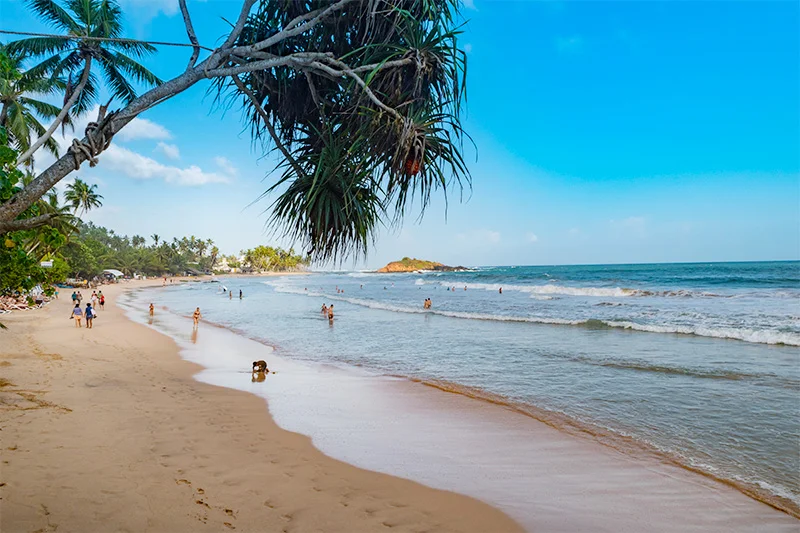
Whispers of Lanka
I was born in a hamlet on the western edge of a tiny teacup bay named Mirissa on the South Coast of Sri Lanka. My childhood was very happy and secure. I played with my cousins and friends on the dusty village roads. We had a few toys to play with, so we always improvised our own games. On rainy days, the village roads became small rivulets on which we sailed paper boats. We could walk from someone’s backyard to another, and there were no fences. We had the freedom to explore the surrounding hills, valleys, and streams.
I was good at school and often helped my classmates with their lessons. I passed the General Certificate of Education (Ordinary Level) at the village school and went to Colombo to study for the General Certificate of Education (Advanced Level). However, I did not like Colombo, and every weekend I hurried back to the village. I was not particularly interested in my studies and struggled in specific subjects. But my teachers knew that I was intelligent and encouraged me to study hard.
To my amazement, I passed the Advanced Level, entered the University of Kelaniya, completed an honours degree in Economics, taught for a few months at a central college, became a lecturer at the same university, and later joined the Department of Census and Statistics as a statistician. Then I went to the University of Wales in the UK to study for an MSc.
The interactions with other international students in my study group, along with very positive recommendations from my professors, helped me secure several jobs in the oil-rich Middle Eastern countries, where I earned salaries unimaginable in Sri Lankan terms. During this period, without much thought, I entered a life focused on material possessions, social status, and excessive consumerism.
Life changes
Unfortunately, this comfortable, enjoyable life changed drastically in the mid-1980s because of the political activities of certain groups. Radicalised youths, brainwashed and empowered by the dynamics of vibrant leftist politics, killed political opponents as well as ordinary people who were reluctant to follow their orders. Their violent methods frightened a large section of Sri Lanka’s middle class into reluctantly accepting country-wide closures of schools, factories, businesses, and government offices.
My father’s generation felt a deep obligation to honour the sacrifices they had made to give us everything we had. There was a belief that you made it in life through your education, and that if you had to work hard, you did. Although I had never seriously considered emigration before, our sons’ education was paramount, and we left Sri Lanka.
Although there were regulations on what could be brought in, migrating to Sydney in the 1980s offered a more relaxed airport experience, with simpler security, a strong presence of airline staff, and a more formal atmosphere. As we were relocating permanently, a few weeks before our departure, we had organised a container to transport sentimental belongings from our home. Our flight baggage was minimal, which puzzled the customs officer, but he laughed when he saw another bulky item on a separate trolley. It was a large box containing a bookshelf purchased in Singapore. Upon discovering that a new migrant family was arriving in Australia with a 32-volume Encyclopaedia Britannica set weighing approximately 250 kilograms, he became cheerful, relaxed his jaw, and said, G’day!
Settling in Sydney
We settled in Epping, Sydney, and enrolled our sons in Epping Boys’ High School. Within one week of our arrival from Sri Lanka, we both found jobs: my wife in her usual accounting position in the private sector, and I was taken on by the Civil Aviation Authority (CAA). While working at the CAA, I sat the Australian Graduate Admission Test. I secured a graduate position with the Australian Bureau of Statistics (ABS) in Canberra, ACT.
We bought a house in Florey, close to my office in Belconnen. The roads near the house were eerily quiet. Back in my hometown of Pelawatta, outside Colombo, my life had a distinct soundtrack. I woke up every morning to the radios blasting ‘pirith’ from the nearby houses; the music of the bread delivery van announcing its arrival, an old man was muttering wild curses to someone while setting up his thambili cart near the junction, free-ranging ‘pariah’ dogs were barking at every moving thing and shadows. Even the wildlife was noisy- black crows gathered on the branches of the mango tree in front of the house to perform a mournful dirge in the morning.
Our Australian neighbours gave us good advice and guidance, and we gradually settled in. If one of the complaints about Asians is that they “won’t join in or integrate to the same degree as Australians do,” this did not apply to us! We never attempted to become Aussies; that was impossible because we didn’t have tanned skin, hazel eyes, or blonde hair, but we did join in the Australian way of life. Having a beer with my next-door neighbour on the weekend and a biannual get-together with the residents of the lane became a routine. Walking or cycling ten kilometres around the Ginninderra Lake with a fit-fanatic of a neighbour was a weekly ritual that I rarely skipped.
Almost every year, early in the New Year, we went to the South Coast. My family and two of our best friends shared a rented house near the beach for a week. There’s not much to do except mix with lots of families with kids, dogs on the beach, lazy days in the sun with a barbecue and a couple of beers in the evening, watching golden sunsets. When you think about Australian summer holidays, that’s all you really need, and that’s all we had!
Caught between two cultures
We tried to hold on to our national tradition of warm hospitality by organising weekend meals with our friends. Enticed by the promise of my wife’s home-cooked feast, our Sri Lankan friends would congregate at our place. Each family would also bring a special dish of food to share. Our house would be crammed with my friends, their spouses and children, the sound of laughter and loud chatter – English mingled with Sinhala – and the aroma of spicy food.
We loved the togetherness, the feeling of never being alone, and the deep sense of belonging within the community. That doesn’t mean I had no regrets in my Australian lifestyle, no matter how trivial they may have seemed. I would have seen migration to another country only as a change of abode and employment, and I would rarely have expected it to bring about far greater changes to my psychological role and identity. In Sri Lanka, I have grown to maturity within a society with rigid demarcation lines between academic, professional, and other groups.
Furthermore, the transplantation from a patriarchal society where family bonds were essential to a culture where individual pursuit of happiness tended to undermine traditional values was a difficult one for me. While I struggled with my changing role, my sons quickly adopted the behaviour and aspirations of their Australian peers. A significant part of our sons’ challenges lay in their being the first generation of Sri Lankan-Australians.
The uniqueness of the responsibilities they discovered while growing up in Australia, and with their parents coming from another country, required them to play a linguistic mediator role, and we, as parents, had to play the cultural mediator role. They were more gregarious and adaptive than we were, and consequently, there was an instant, unrestrained immersion in cultural diversity and plurality.
Technology
They became articulate spokesmen for young Australians growing up in a world where information technology and transactions have become faster, more advanced, and much more widespread. My work in the ABS for nearly twenty years has followed cycles, from data collection, processing, quality assurance, and analysis to mapping, research, and publishing. As the work was mainly computer-based and required assessing and interrogating large datasets, I often had to depend heavily on in-house software developers and mainframe programmers. Over that time, I have worked in several areas of the ABS, making a valuable contribution and gaining a wide range of experience in national accounting.
I immensely valued the unbiased nature of my work, in which the ABS strived to inform its readers without the influence of public opinion or government decisions. It made me proud to work for an organisation that had a high regard for quality, accuracy, and confidentiality. I’m not exaggerating, but it is one of the world’s best statistical organisations! I rubbed shoulders with the greatest statistical minds. The value of this experience was that it enabled me to secure many assignments in Vanuatu, Fiji, East Timor, Saudi Arabia, and the Solomon Islands through the World Bank and the International Monetary Fund after I left the ABS.
Living in Australia
Studying and living in Australia gave my sons ample opportunities to realise that their success depended not on acquiring material wealth but on building human capital. They discovered that it was the sum total of their skills embodied within them: education, intelligence, creativity, work experience and even the ability to play basketball and cricket competitively. They knew it was what they would be left with if someone stripped away all of their assets. So they did their best to pursue their careers on that path and achieve their life goals. Of course, the healthy Australian economy mattered too. As an economist said, “A strong economy did not transform a valet parking attendant into a professor. Investment in human capital did that.”
Nostalgia
After living in Australia for several decades, do I miss Sri Lanka? Which country deserves my preference, the one where I was born or the one to which I migrated? There is no single answer; it depends on opportunities, prospects, lifestyle, and family. Factors such as the cost of living, healthcare, climate, and culture also play significant roles in shaping this preference. Tradition in a slow-motion place like Sri Lanka is an ethical code based on honouring those who do things the same way you do, and dishonour those who don’t. However, in Australia, one has the freedom to express oneself, to debate openly, to hold unconventional views, to be more immune to peer pressure, and not to have one’s every action scrutinised and discussed.
For many years, I have navigated the challenges of cultural differences, conflicting values, and the constant negotiation of where I truly ‘belong.’ Instead of yearning for a ‘dream home’ where I once lived, I have struggled, and to some extent succeeded, to find a home where I live now. This does not mean I have forgotten or discarded my roots. As one Sri Lankan-Australian senior executive remarked, “I have not restricted myself to the box I came in… I was not the ethnicity, skin colour, or lack thereof, of the typical Australian… but that has been irrelevant to my ability to contribute to the things which are important to me and to the country adopted by me.” Now, why do I live where I live – in that old house in Florey? I love the freshness of the air, away from the city smog, noisy traffic, and fumes. I enjoy walking in the evening along the tree-lined avenues and footpaths in my suburb, and occasionally I see a kangaroo hopping along the nature strip. I like the abundance of trees and birds singing at my back door. There are many species of birds in the area, but a common link with ours is the melodious warbling of resident magpies. My wife has been feeding them for several years, and we see the new fledglings every year. At first light and in the evening, they walk up to the back door and sing for their meal. The magpie is an Australian icon, and I think its singing is one of the most melodious sounds in the suburban areas and even more so in the bush.
by Siri Ipalawatte
Features
Big scene for models…

Modelling has turned out to be a big scene here and now there are lots of opportunities for girls and boys to excel as models.
Of course, one can’t step onto the ramp without proper training, and training should be in the hands of those who are aware of what modelling is all about.
Rukmal Senanayake is very much in the news these days and his Model With Ruki – Model Academy & Agency – is responsible for bringing into the limelight, not only upcoming models but also contestants participating in beauty pageants, especially internationally.
On the 29th of January, this year, it was a vibrant scene at the Temple Trees Auditorium, in Colombo, when Rukmal introduced the Grey Goose Road To Future Model Hunt.

Tharaka Gurukanda … in
the scene with Rukmal
This is the second Model Hunt to be held in Sri Lanka; the first was in 2023, at Nelum Pokuna, where over 150 models were able to showcase their skills at one of the largest fashion ramps in Sri Lanka.
The concept was created by Rukmal Senanayake and co-founded by Tharaka Gurukanda.
Future Model Hunt, is the only Southeast Asian fashion show for upcoming models, and designers, to work along and create a career for their future.
The Grey Goose Road To Future Model Hunt, which showcased two segments, brought into the limelight several models, including students of Ruki’s Model Academy & Agency and those who are established as models.
An enthusiastic audience was kept spellbound by the happenings on the ramp.

Doing it differently
Four candidates were also crowned, at this prestigious event, and they will represent Sri Lanka at the respective international pageants.
Those who missed the Grey Goose Road To Future Model Hunt, held last month, can look forward to another exciting Future Model Hunt event, scheduled for the month of May, 2026, where, I’m told, over 150 models will walk the ramp, along with several designers.
It will be held at a prime location in Colombo with an audience count, expected to be over 2000.
Model With Ruki offers training for ramp modelling and beauty pageants and other professional modelling areas.
Their courses cover: Ramp walk techniques, Posture and grooming, Pose and expression, Runway etiquette, and Photo shoots and portfolio building,
They prepare models for local and international fashion events, shoots, and competitions and even send models abroad for various promotional events.
-

 Life style5 days ago
Life style5 days agoMarriot new GM Suranga
-

 Business4 days ago
Business4 days agoMinistry of Brands to launch Sri Lanka’s first off-price retail destination
-

 Features5 days ago
Features5 days agoMonks’ march, in America and Sri Lanka
-

 Features5 days ago
Features5 days agoThe Rise of Takaichi
-

 Features5 days ago
Features5 days agoWetlands of Sri Lanka:
-

 News5 days ago
News5 days agoThailand to recruit 10,000 Lankans under new labour pact
-

 News5 days ago
News5 days agoMassive Sangha confab to address alleged injustices against monks
-

 News3 days ago
News3 days agoIMF MD here








